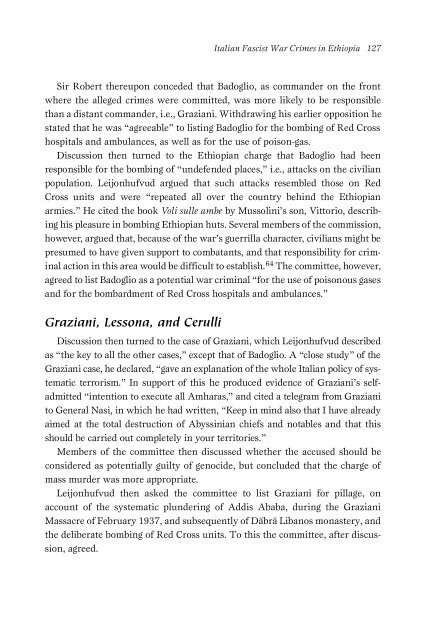Italian Fascist War Crimes in Ethiopia - Societa italiana di storia ...
Italian Fascist War Crimes in Ethiopia - Societa italiana di storia ...
Italian Fascist War Crimes in Ethiopia - Societa italiana di storia ...
Create successful ePaper yourself
Turn your PDF publications into a flip-book with our unique Google optimized e-Paper software.
<strong>Italian</strong> <strong>Fascist</strong> <strong>War</strong> <strong>Crimes</strong> <strong>in</strong> <strong>Ethiopia</strong> 127<br />
Sir Robert thereupon conceded that Badoglio, as commander on the front<br />
where the alleged crimes were committed, was more likely to be responsible<br />
than a <strong>di</strong>stant commander, i.e., Graziani. Withdraw<strong>in</strong>g his earlier opposition he<br />
stated that he was “agreeable” to list<strong>in</strong>g Badoglio for the bomb<strong>in</strong>g of Red Cross<br />
hospitals and ambulances, as well as for the use of poison-gas.<br />
Discussion then turned to the <strong>Ethiopia</strong>n charge that Badoglio had been<br />
responsible for the bomb<strong>in</strong>g of “undefended places,” i.e., attacks on the civilian<br />
population. Leijonhufvud argued that such attacks resembled those on Re d<br />
C ross units and we re “repeated all over the country beh<strong>in</strong>d the <strong>Ethiopia</strong>n<br />
armies.” He cited the book Voli sulle ambe by Mussol<strong>in</strong>i’s son, Vittorio, describ<strong>in</strong>g<br />
his pleasure <strong>in</strong> bomb<strong>in</strong>g <strong>Ethiopia</strong>n huts. Seve ral members of the commission,<br />
h oweve r, argued that, because of the war’s guerrilla chara c t e r, civilians might be<br />
p resumed to have given support to combatants, and that responsibility for crim<strong>in</strong>al<br />
action <strong>in</strong> this area would be <strong>di</strong>fficult to establish. 6 4 The committee, howeve r,<br />
a g reed to list Badoglio as a potential war crim<strong>in</strong>al “for the use of poisonous gases<br />
and for the bombardment of Red Cross hospitals and ambulances.”<br />
Graziani, Lessona, and Cerulli<br />
Discussion then turned to the case of Graziani, which Leijonhufvud described<br />
as “the key to all the other cases,” except that of Badoglio. A “close study” of the<br />
G raziani case, he declared, “gave an explanation of the whole <strong>Italian</strong> policy of systematic<br />
terrorism.” In support of this he produced evidence of Graziani’s selfadmitted<br />
“<strong>in</strong>tention to execute all Amharas,” and cited a telegram from Gra z i a n i<br />
to General Nasi, <strong>in</strong> which he had written, “Keep <strong>in</strong> m<strong>in</strong>d also that I have alre a d y<br />
aimed at the total destruction of Abyss<strong>in</strong>ian chiefs and notables and that this<br />
should be carried out completely <strong>in</strong> your territories.”<br />
Members of the committee then <strong>di</strong>scussed whether the accused should be<br />
considered as potentially guilty of genocide, but concluded that the charge of<br />
mass murder was more appropriate.<br />
Leijonhufvud then asked the committee to list Graziani for pillage, on<br />
account of the systematic plunder<strong>in</strong>g of Ad<strong>di</strong>s Ababa, dur<strong>in</strong>g the Graziani<br />
Massacre of February 1937, and subsequently of Däbrä Libanos monastery, and<br />
the deliberate bomb<strong>in</strong>g of Red Cross units. To this the committee, after <strong>di</strong>scussion,<br />
agreed.

















